Sustainable Tourism in the USA: Environment Analysis and Stakeholders
VerifiedAdded on 2023/06/07
|10
|2734
|236
Report
AI Summary
This report provides an analysis of the tourism environment in the USA, focusing on sustainable tourism development. It discusses the concept and principles of sustainable tourism, the role of stakeholders in decision-making, and the impact of both macro and micro environmental elements. The report also examines how tourist motivation and the competitive micro-environment influence the demand for tourism products. It concludes that sustainable tourism development is crucial for the country's economic growth, emphasizing the importance of stakeholder engagement and the implementation of appropriate strategies by tourism organizations to achieve sustainable tourism goals effectively.
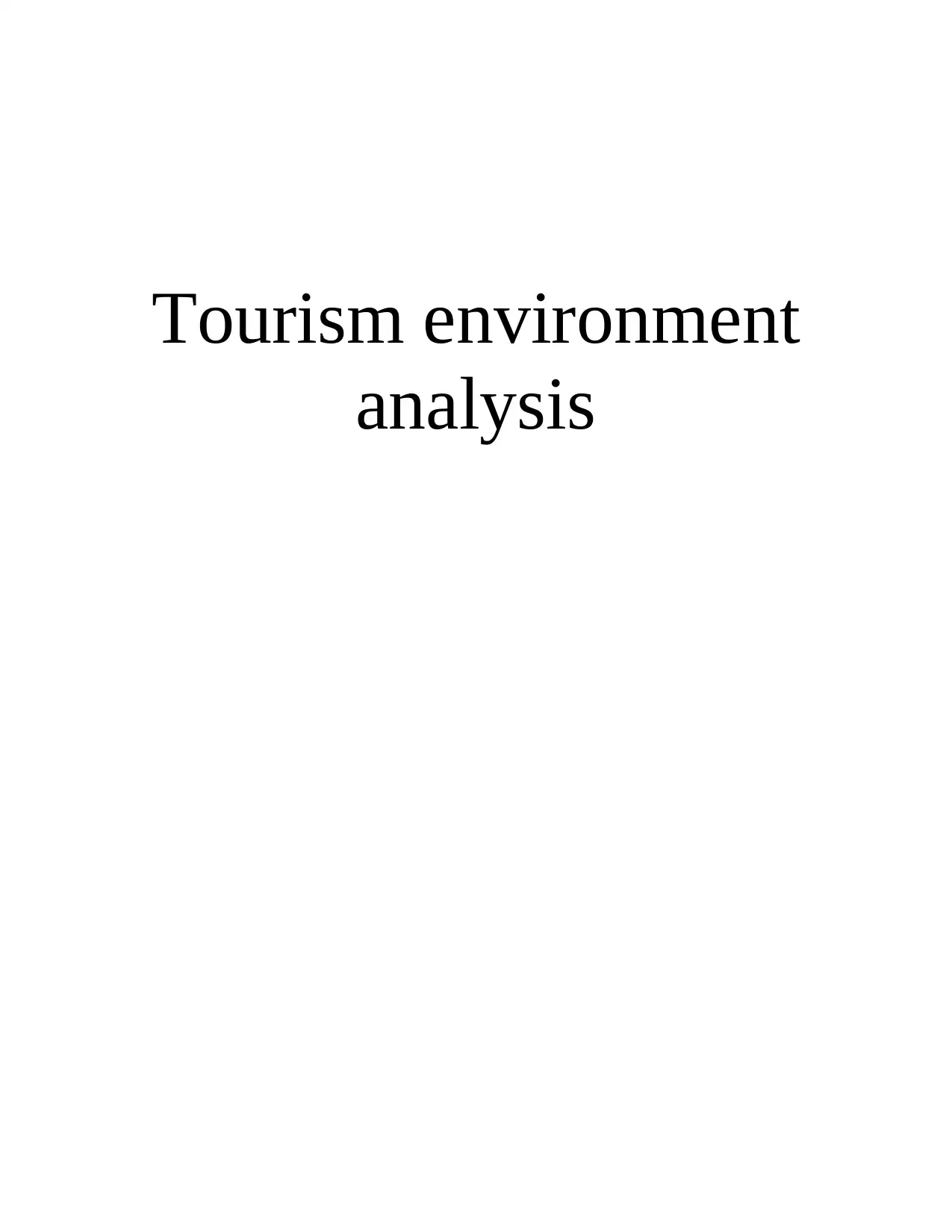
Tourism environment
analysis
analysis
Paraphrase This Document
Need a fresh take? Get an instant paraphrase of this document with our AI Paraphraser
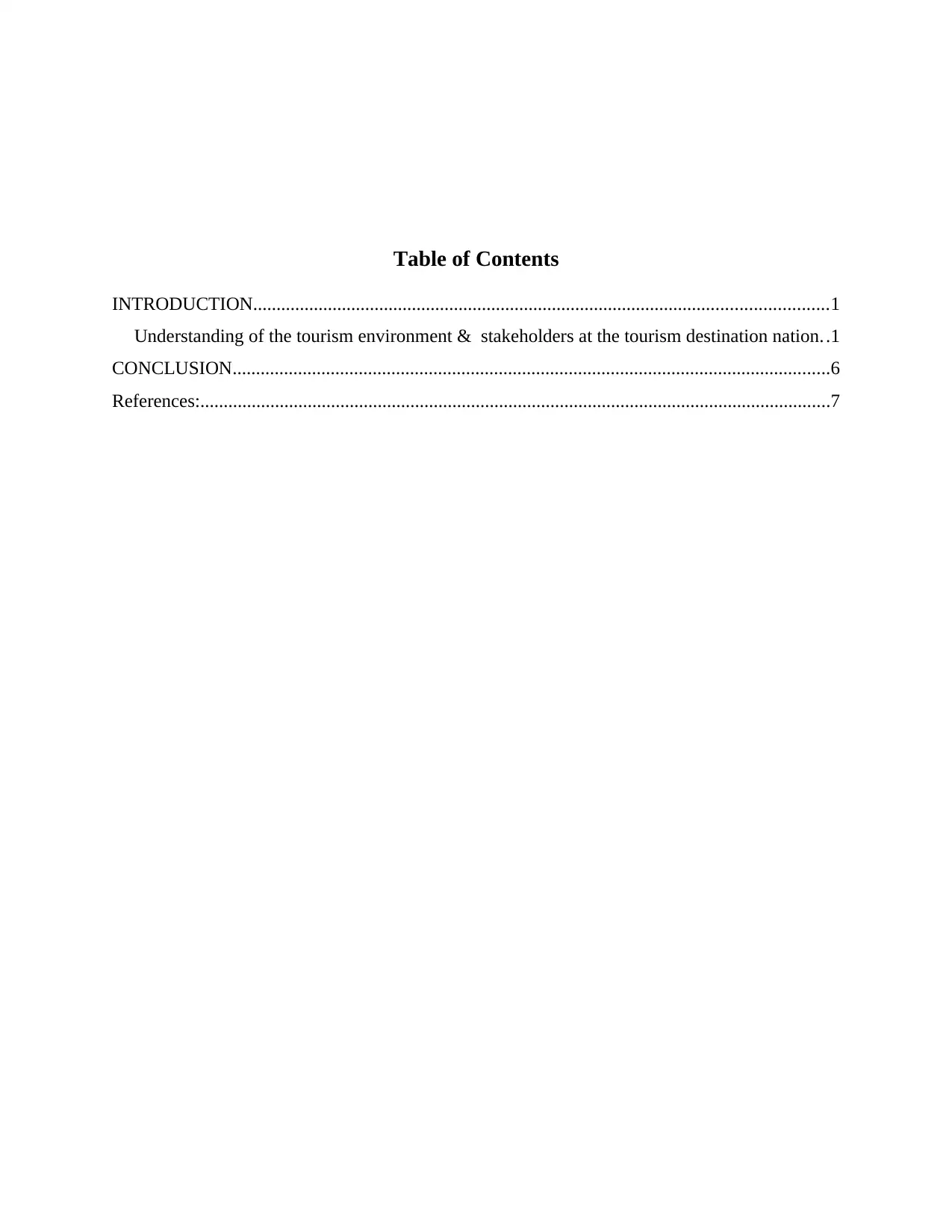
Table of Contents
INTRODUCTION...........................................................................................................................1
Understanding of the tourism environment & stakeholders at the tourism destination nation. .1
CONCLUSION................................................................................................................................6
References:.......................................................................................................................................7
INTRODUCTION...........................................................................................................................1
Understanding of the tourism environment & stakeholders at the tourism destination nation. .1
CONCLUSION................................................................................................................................6
References:.......................................................................................................................................7
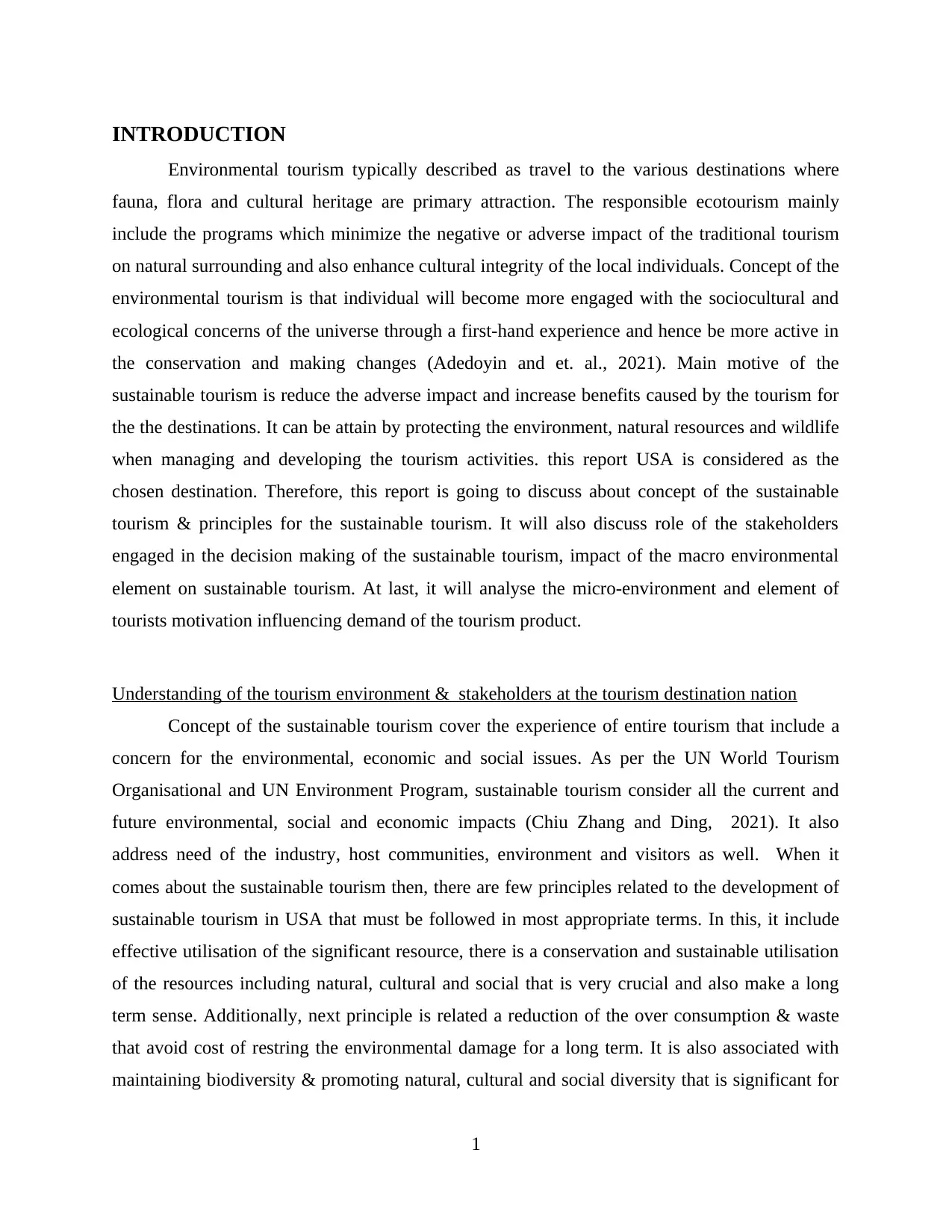
INTRODUCTION
Environmental tourism typically described as travel to the various destinations where
fauna, flora and cultural heritage are primary attraction. The responsible ecotourism mainly
include the programs which minimize the negative or adverse impact of the traditional tourism
on natural surrounding and also enhance cultural integrity of the local individuals. Concept of the
environmental tourism is that individual will become more engaged with the sociocultural and
ecological concerns of the universe through a first-hand experience and hence be more active in
the conservation and making changes (Adedoyin and et. al., 2021). Main motive of the
sustainable tourism is reduce the adverse impact and increase benefits caused by the tourism for
the the destinations. It can be attain by protecting the environment, natural resources and wildlife
when managing and developing the tourism activities. this report USA is considered as the
chosen destination. Therefore, this report is going to discuss about concept of the sustainable
tourism & principles for the sustainable tourism. It will also discuss role of the stakeholders
engaged in the decision making of the sustainable tourism, impact of the macro environmental
element on sustainable tourism. At last, it will analyse the micro-environment and element of
tourists motivation influencing demand of the tourism product.
Understanding of the tourism environment & stakeholders at the tourism destination nation
Concept of the sustainable tourism cover the experience of entire tourism that include a
concern for the environmental, economic and social issues. As per the UN World Tourism
Organisational and UN Environment Program, sustainable tourism consider all the current and
future environmental, social and economic impacts (Chiu Zhang and Ding, 2021). It also
address need of the industry, host communities, environment and visitors as well. When it
comes about the sustainable tourism then, there are few principles related to the development of
sustainable tourism in USA that must be followed in most appropriate terms. In this, it include
effective utilisation of the significant resource, there is a conservation and sustainable utilisation
of the resources including natural, cultural and social that is very crucial and also make a long
term sense. Additionally, next principle is related a reduction of the over consumption & waste
that avoid cost of restring the environmental damage for a long term. It is also associated with
maintaining biodiversity & promoting natural, cultural and social diversity that is significant for
1
Environmental tourism typically described as travel to the various destinations where
fauna, flora and cultural heritage are primary attraction. The responsible ecotourism mainly
include the programs which minimize the negative or adverse impact of the traditional tourism
on natural surrounding and also enhance cultural integrity of the local individuals. Concept of the
environmental tourism is that individual will become more engaged with the sociocultural and
ecological concerns of the universe through a first-hand experience and hence be more active in
the conservation and making changes (Adedoyin and et. al., 2021). Main motive of the
sustainable tourism is reduce the adverse impact and increase benefits caused by the tourism for
the the destinations. It can be attain by protecting the environment, natural resources and wildlife
when managing and developing the tourism activities. this report USA is considered as the
chosen destination. Therefore, this report is going to discuss about concept of the sustainable
tourism & principles for the sustainable tourism. It will also discuss role of the stakeholders
engaged in the decision making of the sustainable tourism, impact of the macro environmental
element on sustainable tourism. At last, it will analyse the micro-environment and element of
tourists motivation influencing demand of the tourism product.
Understanding of the tourism environment & stakeholders at the tourism destination nation
Concept of the sustainable tourism cover the experience of entire tourism that include a
concern for the environmental, economic and social issues. As per the UN World Tourism
Organisational and UN Environment Program, sustainable tourism consider all the current and
future environmental, social and economic impacts (Chiu Zhang and Ding, 2021). It also
address need of the industry, host communities, environment and visitors as well. When it
comes about the sustainable tourism then, there are few principles related to the development of
sustainable tourism in USA that must be followed in most appropriate terms. In this, it include
effective utilisation of the significant resource, there is a conservation and sustainable utilisation
of the resources including natural, cultural and social that is very crucial and also make a long
term sense. Additionally, next principle is related a reduction of the over consumption & waste
that avoid cost of restring the environmental damage for a long term. It is also associated with
maintaining biodiversity & promoting natural, cultural and social diversity that is significant for
1
⊘ This is a preview!⊘
Do you want full access?
Subscribe today to unlock all pages.

Trusted by 1+ million students worldwide
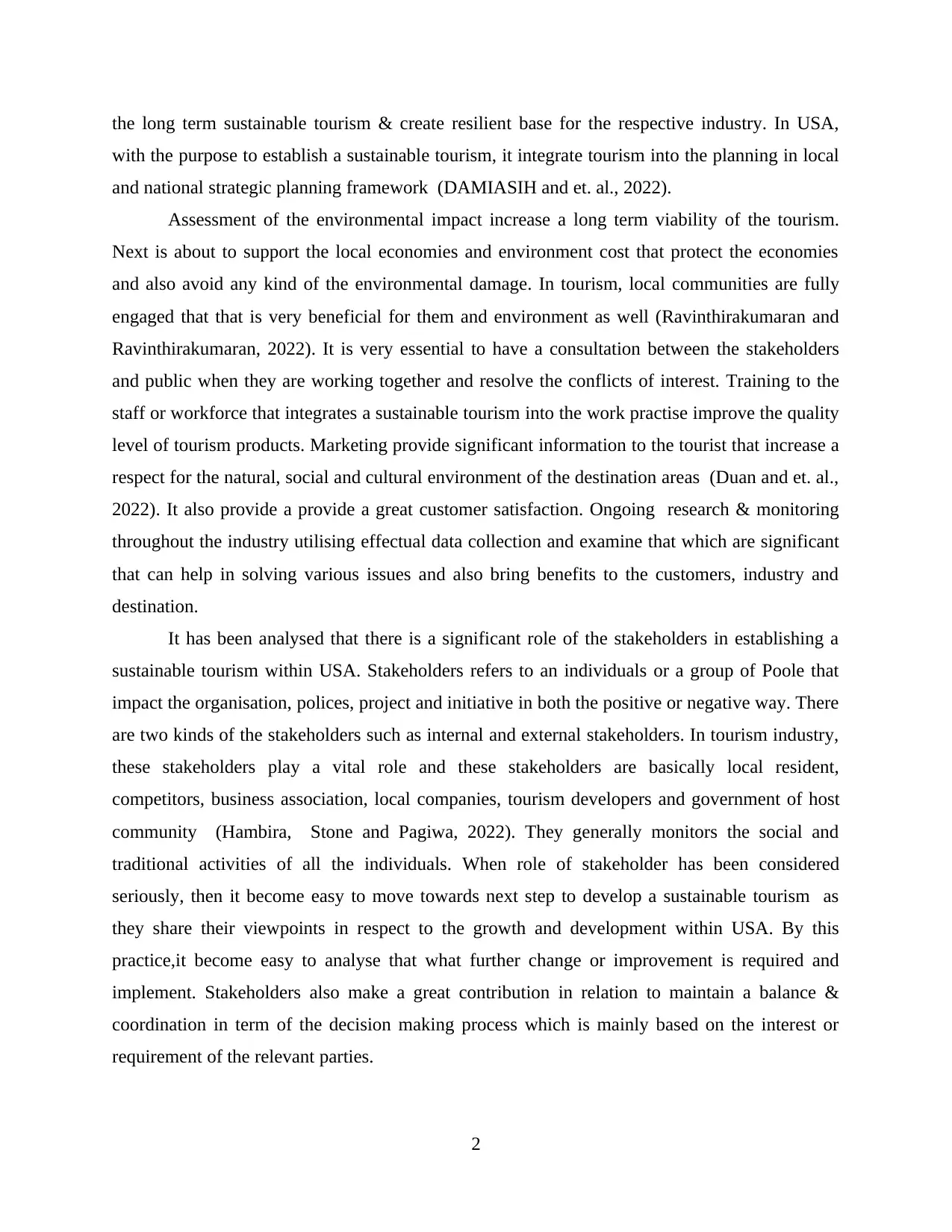
the long term sustainable tourism & create resilient base for the respective industry. In USA,
with the purpose to establish a sustainable tourism, it integrate tourism into the planning in local
and national strategic planning framework (DAMIASIH and et. al., 2022).
Assessment of the environmental impact increase a long term viability of the tourism.
Next is about to support the local economies and environment cost that protect the economies
and also avoid any kind of the environmental damage. In tourism, local communities are fully
engaged that that is very beneficial for them and environment as well (Ravinthirakumaran and
Ravinthirakumaran, 2022). It is very essential to have a consultation between the stakeholders
and public when they are working together and resolve the conflicts of interest. Training to the
staff or workforce that integrates a sustainable tourism into the work practise improve the quality
level of tourism products. Marketing provide significant information to the tourist that increase a
respect for the natural, social and cultural environment of the destination areas (Duan and et. al.,
2022). It also provide a provide a great customer satisfaction. Ongoing research & monitoring
throughout the industry utilising effectual data collection and examine that which are significant
that can help in solving various issues and also bring benefits to the customers, industry and
destination.
It has been analysed that there is a significant role of the stakeholders in establishing a
sustainable tourism within USA. Stakeholders refers to an individuals or a group of Poole that
impact the organisation, polices, project and initiative in both the positive or negative way. There
are two kinds of the stakeholders such as internal and external stakeholders. In tourism industry,
these stakeholders play a vital role and these stakeholders are basically local resident,
competitors, business association, local companies, tourism developers and government of host
community (Hambira, Stone and Pagiwa, 2022). They generally monitors the social and
traditional activities of all the individuals. When role of stakeholder has been considered
seriously, then it become easy to move towards next step to develop a sustainable tourism as
they share their viewpoints in respect to the growth and development within USA. By this
practice,it become easy to analyse that what further change or improvement is required and
implement. Stakeholders also make a great contribution in relation to maintain a balance &
coordination in term of the decision making process which is mainly based on the interest or
requirement of the relevant parties.
2
with the purpose to establish a sustainable tourism, it integrate tourism into the planning in local
and national strategic planning framework (DAMIASIH and et. al., 2022).
Assessment of the environmental impact increase a long term viability of the tourism.
Next is about to support the local economies and environment cost that protect the economies
and also avoid any kind of the environmental damage. In tourism, local communities are fully
engaged that that is very beneficial for them and environment as well (Ravinthirakumaran and
Ravinthirakumaran, 2022). It is very essential to have a consultation between the stakeholders
and public when they are working together and resolve the conflicts of interest. Training to the
staff or workforce that integrates a sustainable tourism into the work practise improve the quality
level of tourism products. Marketing provide significant information to the tourist that increase a
respect for the natural, social and cultural environment of the destination areas (Duan and et. al.,
2022). It also provide a provide a great customer satisfaction. Ongoing research & monitoring
throughout the industry utilising effectual data collection and examine that which are significant
that can help in solving various issues and also bring benefits to the customers, industry and
destination.
It has been analysed that there is a significant role of the stakeholders in establishing a
sustainable tourism within USA. Stakeholders refers to an individuals or a group of Poole that
impact the organisation, polices, project and initiative in both the positive or negative way. There
are two kinds of the stakeholders such as internal and external stakeholders. In tourism industry,
these stakeholders play a vital role and these stakeholders are basically local resident,
competitors, business association, local companies, tourism developers and government of host
community (Hambira, Stone and Pagiwa, 2022). They generally monitors the social and
traditional activities of all the individuals. When role of stakeholder has been considered
seriously, then it become easy to move towards next step to develop a sustainable tourism as
they share their viewpoints in respect to the growth and development within USA. By this
practice,it become easy to analyse that what further change or improvement is required and
implement. Stakeholders also make a great contribution in relation to maintain a balance &
coordination in term of the decision making process which is mainly based on the interest or
requirement of the relevant parties.
2
Paraphrase This Document
Need a fresh take? Get an instant paraphrase of this document with our AI Paraphraser
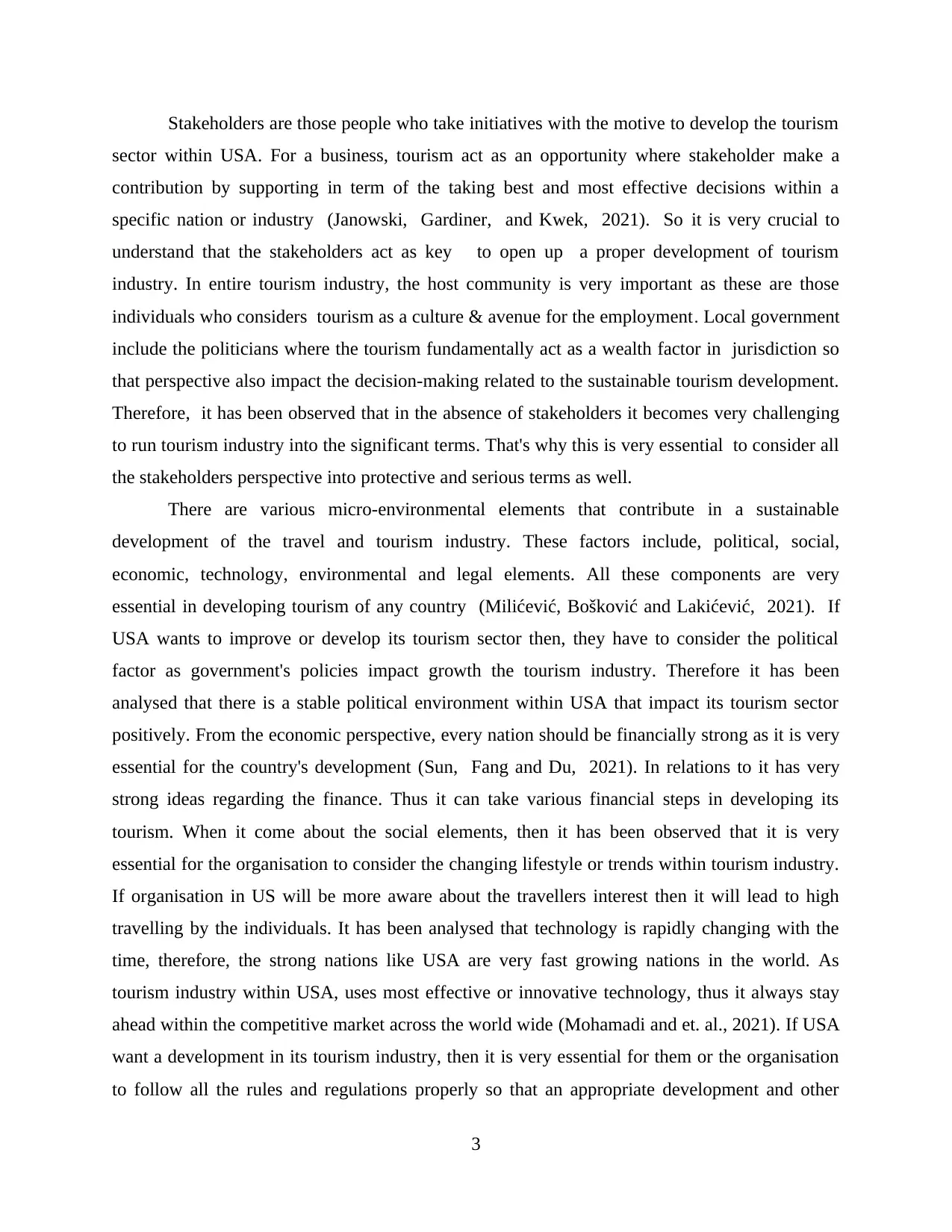
Stakeholders are those people who take initiatives with the motive to develop the tourism
sector within USA. For a business, tourism act as an opportunity where stakeholder make a
contribution by supporting in term of the taking best and most effective decisions within a
specific nation or industry (Janowski, Gardiner, and Kwek, 2021). So it is very crucial to
understand that the stakeholders act as key to open up a proper development of tourism
industry. In entire tourism industry, the host community is very important as these are those
individuals who considers tourism as a culture & avenue for the employment. Local government
include the politicians where the tourism fundamentally act as a wealth factor in jurisdiction so
that perspective also impact the decision-making related to the sustainable tourism development.
Therefore, it has been observed that in the absence of stakeholders it becomes very challenging
to run tourism industry into the significant terms. That's why this is very essential to consider all
the stakeholders perspective into protective and serious terms as well.
There are various micro-environmental elements that contribute in a sustainable
development of the travel and tourism industry. These factors include, political, social,
economic, technology, environmental and legal elements. All these components are very
essential in developing tourism of any country (Milićević, Bošković and Lakićević, 2021). If
USA wants to improve or develop its tourism sector then, they have to consider the political
factor as government's policies impact growth the tourism industry. Therefore it has been
analysed that there is a stable political environment within USA that impact its tourism sector
positively. From the economic perspective, every nation should be financially strong as it is very
essential for the country's development (Sun, Fang and Du, 2021). In relations to it has very
strong ideas regarding the finance. Thus it can take various financial steps in developing its
tourism. When it come about the social elements, then it has been observed that it is very
essential for the organisation to consider the changing lifestyle or trends within tourism industry.
If organisation in US will be more aware about the travellers interest then it will lead to high
travelling by the individuals. It has been analysed that technology is rapidly changing with the
time, therefore, the strong nations like USA are very fast growing nations in the world. As
tourism industry within USA, uses most effective or innovative technology, thus it always stay
ahead within the competitive market across the world wide (Mohamadi and et. al., 2021). If USA
want a development in its tourism industry, then it is very essential for them or the organisation
to follow all the rules and regulations properly so that an appropriate development and other
3
sector within USA. For a business, tourism act as an opportunity where stakeholder make a
contribution by supporting in term of the taking best and most effective decisions within a
specific nation or industry (Janowski, Gardiner, and Kwek, 2021). So it is very crucial to
understand that the stakeholders act as key to open up a proper development of tourism
industry. In entire tourism industry, the host community is very important as these are those
individuals who considers tourism as a culture & avenue for the employment. Local government
include the politicians where the tourism fundamentally act as a wealth factor in jurisdiction so
that perspective also impact the decision-making related to the sustainable tourism development.
Therefore, it has been observed that in the absence of stakeholders it becomes very challenging
to run tourism industry into the significant terms. That's why this is very essential to consider all
the stakeholders perspective into protective and serious terms as well.
There are various micro-environmental elements that contribute in a sustainable
development of the travel and tourism industry. These factors include, political, social,
economic, technology, environmental and legal elements. All these components are very
essential in developing tourism of any country (Milićević, Bošković and Lakićević, 2021). If
USA wants to improve or develop its tourism sector then, they have to consider the political
factor as government's policies impact growth the tourism industry. Therefore it has been
analysed that there is a stable political environment within USA that impact its tourism sector
positively. From the economic perspective, every nation should be financially strong as it is very
essential for the country's development (Sun, Fang and Du, 2021). In relations to it has very
strong ideas regarding the finance. Thus it can take various financial steps in developing its
tourism. When it come about the social elements, then it has been observed that it is very
essential for the organisation to consider the changing lifestyle or trends within tourism industry.
If organisation in US will be more aware about the travellers interest then it will lead to high
travelling by the individuals. It has been analysed that technology is rapidly changing with the
time, therefore, the strong nations like USA are very fast growing nations in the world. As
tourism industry within USA, uses most effective or innovative technology, thus it always stay
ahead within the competitive market across the world wide (Mohamadi and et. al., 2021). If USA
want a development in its tourism industry, then it is very essential for them or the organisation
to follow all the rules and regulations properly so that an appropriate development and other
3
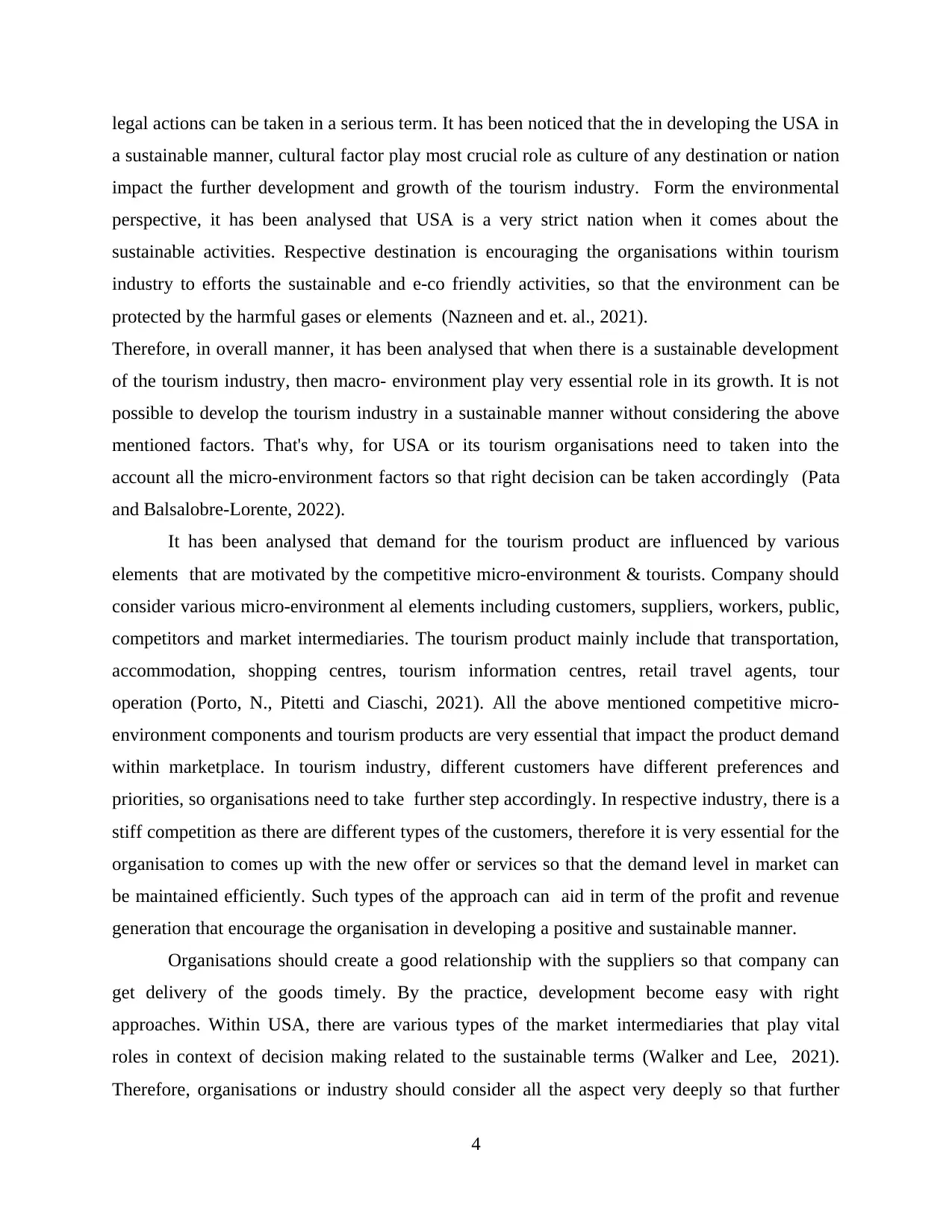
legal actions can be taken in a serious term. It has been noticed that the in developing the USA in
a sustainable manner, cultural factor play most crucial role as culture of any destination or nation
impact the further development and growth of the tourism industry. Form the environmental
perspective, it has been analysed that USA is a very strict nation when it comes about the
sustainable activities. Respective destination is encouraging the organisations within tourism
industry to efforts the sustainable and e-co friendly activities, so that the environment can be
protected by the harmful gases or elements (Nazneen and et. al., 2021).
Therefore, in overall manner, it has been analysed that when there is a sustainable development
of the tourism industry, then macro- environment play very essential role in its growth. It is not
possible to develop the tourism industry in a sustainable manner without considering the above
mentioned factors. That's why, for USA or its tourism organisations need to taken into the
account all the micro-environment factors so that right decision can be taken accordingly (Pata
and Balsalobre-Lorente, 2022).
It has been analysed that demand for the tourism product are influenced by various
elements that are motivated by the competitive micro-environment & tourists. Company should
consider various micro-environment al elements including customers, suppliers, workers, public,
competitors and market intermediaries. The tourism product mainly include that transportation,
accommodation, shopping centres, tourism information centres, retail travel agents, tour
operation (Porto, N., Pitetti and Ciaschi, 2021). All the above mentioned competitive micro-
environment components and tourism products are very essential that impact the product demand
within marketplace. In tourism industry, different customers have different preferences and
priorities, so organisations need to take further step accordingly. In respective industry, there is a
stiff competition as there are different types of the customers, therefore it is very essential for the
organisation to comes up with the new offer or services so that the demand level in market can
be maintained efficiently. Such types of the approach can aid in term of the profit and revenue
generation that encourage the organisation in developing a positive and sustainable manner.
Organisations should create a good relationship with the suppliers so that company can
get delivery of the goods timely. By the practice, development become easy with right
approaches. Within USA, there are various types of the market intermediaries that play vital
roles in context of decision making related to the sustainable terms (Walker and Lee, 2021).
Therefore, organisations or industry should consider all the aspect very deeply so that further
4
a sustainable manner, cultural factor play most crucial role as culture of any destination or nation
impact the further development and growth of the tourism industry. Form the environmental
perspective, it has been analysed that USA is a very strict nation when it comes about the
sustainable activities. Respective destination is encouraging the organisations within tourism
industry to efforts the sustainable and e-co friendly activities, so that the environment can be
protected by the harmful gases or elements (Nazneen and et. al., 2021).
Therefore, in overall manner, it has been analysed that when there is a sustainable development
of the tourism industry, then macro- environment play very essential role in its growth. It is not
possible to develop the tourism industry in a sustainable manner without considering the above
mentioned factors. That's why, for USA or its tourism organisations need to taken into the
account all the micro-environment factors so that right decision can be taken accordingly (Pata
and Balsalobre-Lorente, 2022).
It has been analysed that demand for the tourism product are influenced by various
elements that are motivated by the competitive micro-environment & tourists. Company should
consider various micro-environment al elements including customers, suppliers, workers, public,
competitors and market intermediaries. The tourism product mainly include that transportation,
accommodation, shopping centres, tourism information centres, retail travel agents, tour
operation (Porto, N., Pitetti and Ciaschi, 2021). All the above mentioned competitive micro-
environment components and tourism products are very essential that impact the product demand
within marketplace. In tourism industry, different customers have different preferences and
priorities, so organisations need to take further step accordingly. In respective industry, there is a
stiff competition as there are different types of the customers, therefore it is very essential for the
organisation to comes up with the new offer or services so that the demand level in market can
be maintained efficiently. Such types of the approach can aid in term of the profit and revenue
generation that encourage the organisation in developing a positive and sustainable manner.
Organisations should create a good relationship with the suppliers so that company can
get delivery of the goods timely. By the practice, development become easy with right
approaches. Within USA, there are various types of the market intermediaries that play vital
roles in context of decision making related to the sustainable terms (Walker and Lee, 2021).
Therefore, organisations or industry should consider all the aspect very deeply so that further
4
⊘ This is a preview!⊘
Do you want full access?
Subscribe today to unlock all pages.

Trusted by 1+ million students worldwide
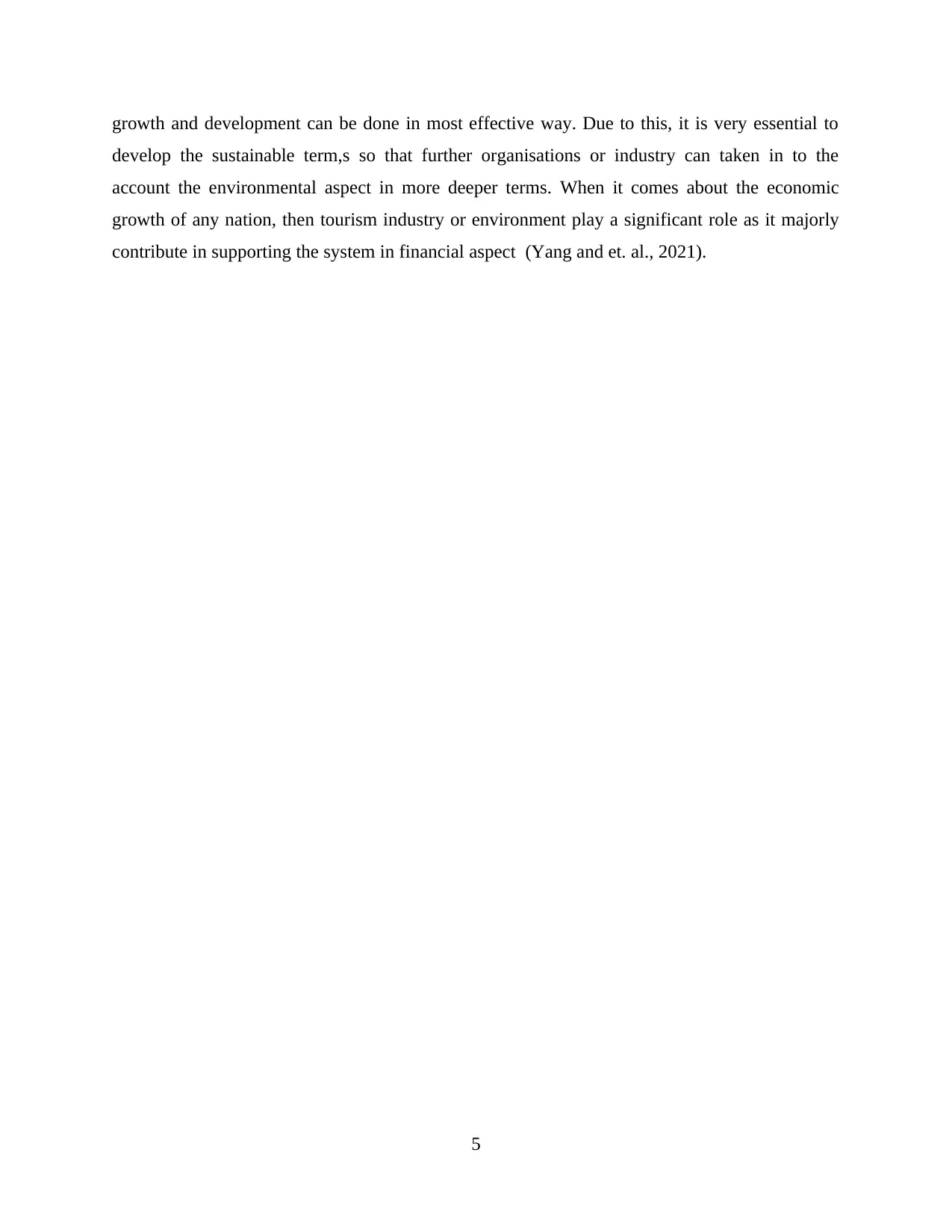
growth and development can be done in most effective way. Due to this, it is very essential to
develop the sustainable term,s so that further organisations or industry can taken in to the
account the environmental aspect in more deeper terms. When it comes about the economic
growth of any nation, then tourism industry or environment play a significant role as it majorly
contribute in supporting the system in financial aspect (Yang and et. al., 2021).
5
develop the sustainable term,s so that further organisations or industry can taken in to the
account the environmental aspect in more deeper terms. When it comes about the economic
growth of any nation, then tourism industry or environment play a significant role as it majorly
contribute in supporting the system in financial aspect (Yang and et. al., 2021).
5
Paraphrase This Document
Need a fresh take? Get an instant paraphrase of this document with our AI Paraphraser
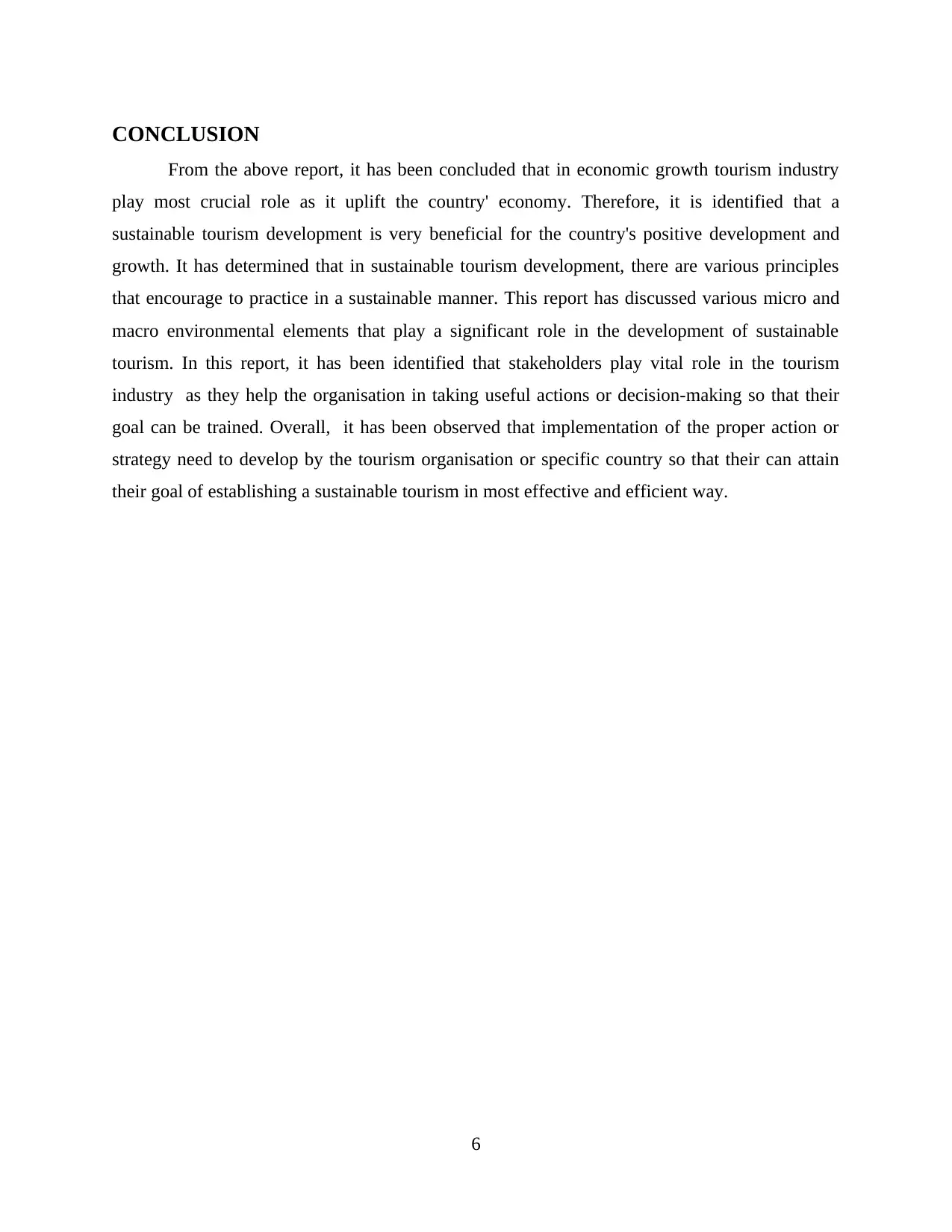
CONCLUSION
From the above report, it has been concluded that in economic growth tourism industry
play most crucial role as it uplift the country' economy. Therefore, it is identified that a
sustainable tourism development is very beneficial for the country's positive development and
growth. It has determined that in sustainable tourism development, there are various principles
that encourage to practice in a sustainable manner. This report has discussed various micro and
macro environmental elements that play a significant role in the development of sustainable
tourism. In this report, it has been identified that stakeholders play vital role in the tourism
industry as they help the organisation in taking useful actions or decision-making so that their
goal can be trained. Overall, it has been observed that implementation of the proper action or
strategy need to develop by the tourism organisation or specific country so that their can attain
their goal of establishing a sustainable tourism in most effective and efficient way.
6
From the above report, it has been concluded that in economic growth tourism industry
play most crucial role as it uplift the country' economy. Therefore, it is identified that a
sustainable tourism development is very beneficial for the country's positive development and
growth. It has determined that in sustainable tourism development, there are various principles
that encourage to practice in a sustainable manner. This report has discussed various micro and
macro environmental elements that play a significant role in the development of sustainable
tourism. In this report, it has been identified that stakeholders play vital role in the tourism
industry as they help the organisation in taking useful actions or decision-making so that their
goal can be trained. Overall, it has been observed that implementation of the proper action or
strategy need to develop by the tourism organisation or specific country so that their can attain
their goal of establishing a sustainable tourism in most effective and efficient way.
6
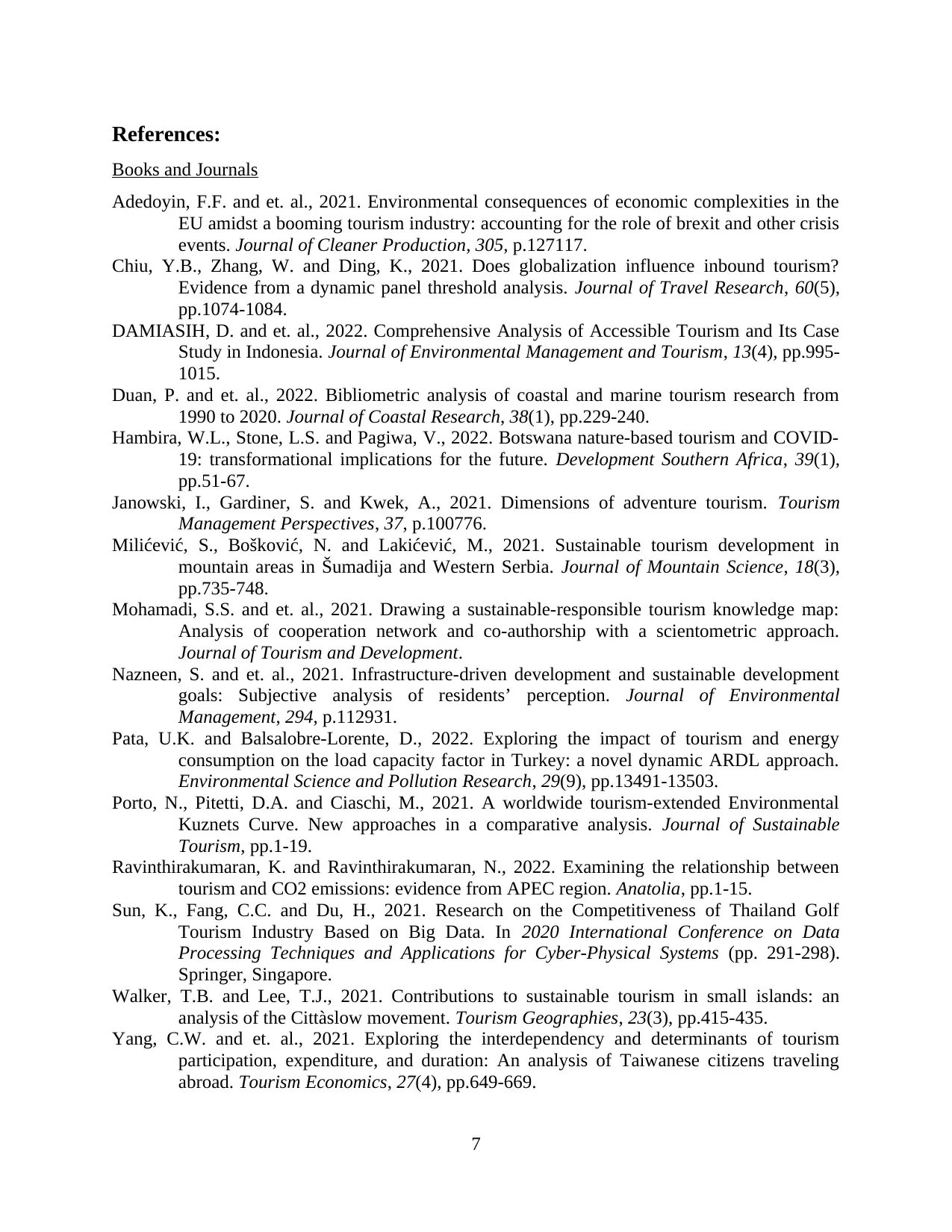
References:
Books and Journals
Adedoyin, F.F. and et. al., 2021. Environmental consequences of economic complexities in the
EU amidst a booming tourism industry: accounting for the role of brexit and other crisis
events. Journal of Cleaner Production, 305, p.127117.
Chiu, Y.B., Zhang, W. and Ding, K., 2021. Does globalization influence inbound tourism?
Evidence from a dynamic panel threshold analysis. Journal of Travel Research, 60(5),
pp.1074-1084.
DAMIASIH, D. and et. al., 2022. Comprehensive Analysis of Accessible Tourism and Its Case
Study in Indonesia. Journal of Environmental Management and Tourism, 13(4), pp.995-
1015.
Duan, P. and et. al., 2022. Bibliometric analysis of coastal and marine tourism research from
1990 to 2020. Journal of Coastal Research, 38(1), pp.229-240.
Hambira, W.L., Stone, L.S. and Pagiwa, V., 2022. Botswana nature-based tourism and COVID-
19: transformational implications for the future. Development Southern Africa, 39(1),
pp.51-67.
Janowski, I., Gardiner, S. and Kwek, A., 2021. Dimensions of adventure tourism. Tourism
Management Perspectives, 37, p.100776.
Milićević, S., Bošković, N. and Lakićević, M., 2021. Sustainable tourism development in
mountain areas in Šumadija and Western Serbia. Journal of Mountain Science, 18(3),
pp.735-748.
Mohamadi, S.S. and et. al., 2021. Drawing a sustainable-responsible tourism knowledge map:
Analysis of cooperation network and co-authorship with a scientometric approach.
Journal of Tourism and Development.
Nazneen, S. and et. al., 2021. Infrastructure-driven development and sustainable development
goals: Subjective analysis of residents’ perception. Journal of Environmental
Management, 294, p.112931.
Pata, U.K. and Balsalobre-Lorente, D., 2022. Exploring the impact of tourism and energy
consumption on the load capacity factor in Turkey: a novel dynamic ARDL approach.
Environmental Science and Pollution Research, 29(9), pp.13491-13503.
Porto, N., Pitetti, D.A. and Ciaschi, M., 2021. A worldwide tourism-extended Environmental
Kuznets Curve. New approaches in a comparative analysis. Journal of Sustainable
Tourism, pp.1-19.
Ravinthirakumaran, K. and Ravinthirakumaran, N., 2022. Examining the relationship between
tourism and CO2 emissions: evidence from APEC region. Anatolia, pp.1-15.
Sun, K., Fang, C.C. and Du, H., 2021. Research on the Competitiveness of Thailand Golf
Tourism Industry Based on Big Data. In 2020 International Conference on Data
Processing Techniques and Applications for Cyber-Physical Systems (pp. 291-298).
Springer, Singapore.
Walker, T.B. and Lee, T.J., 2021. Contributions to sustainable tourism in small islands: an
analysis of the Cittàslow movement. Tourism Geographies, 23(3), pp.415-435.
Yang, C.W. and et. al., 2021. Exploring the interdependency and determinants of tourism
participation, expenditure, and duration: An analysis of Taiwanese citizens traveling
abroad. Tourism Economics, 27(4), pp.649-669.
7
Books and Journals
Adedoyin, F.F. and et. al., 2021. Environmental consequences of economic complexities in the
EU amidst a booming tourism industry: accounting for the role of brexit and other crisis
events. Journal of Cleaner Production, 305, p.127117.
Chiu, Y.B., Zhang, W. and Ding, K., 2021. Does globalization influence inbound tourism?
Evidence from a dynamic panel threshold analysis. Journal of Travel Research, 60(5),
pp.1074-1084.
DAMIASIH, D. and et. al., 2022. Comprehensive Analysis of Accessible Tourism and Its Case
Study in Indonesia. Journal of Environmental Management and Tourism, 13(4), pp.995-
1015.
Duan, P. and et. al., 2022. Bibliometric analysis of coastal and marine tourism research from
1990 to 2020. Journal of Coastal Research, 38(1), pp.229-240.
Hambira, W.L., Stone, L.S. and Pagiwa, V., 2022. Botswana nature-based tourism and COVID-
19: transformational implications for the future. Development Southern Africa, 39(1),
pp.51-67.
Janowski, I., Gardiner, S. and Kwek, A., 2021. Dimensions of adventure tourism. Tourism
Management Perspectives, 37, p.100776.
Milićević, S., Bošković, N. and Lakićević, M., 2021. Sustainable tourism development in
mountain areas in Šumadija and Western Serbia. Journal of Mountain Science, 18(3),
pp.735-748.
Mohamadi, S.S. and et. al., 2021. Drawing a sustainable-responsible tourism knowledge map:
Analysis of cooperation network and co-authorship with a scientometric approach.
Journal of Tourism and Development.
Nazneen, S. and et. al., 2021. Infrastructure-driven development and sustainable development
goals: Subjective analysis of residents’ perception. Journal of Environmental
Management, 294, p.112931.
Pata, U.K. and Balsalobre-Lorente, D., 2022. Exploring the impact of tourism and energy
consumption on the load capacity factor in Turkey: a novel dynamic ARDL approach.
Environmental Science and Pollution Research, 29(9), pp.13491-13503.
Porto, N., Pitetti, D.A. and Ciaschi, M., 2021. A worldwide tourism-extended Environmental
Kuznets Curve. New approaches in a comparative analysis. Journal of Sustainable
Tourism, pp.1-19.
Ravinthirakumaran, K. and Ravinthirakumaran, N., 2022. Examining the relationship between
tourism and CO2 emissions: evidence from APEC region. Anatolia, pp.1-15.
Sun, K., Fang, C.C. and Du, H., 2021. Research on the Competitiveness of Thailand Golf
Tourism Industry Based on Big Data. In 2020 International Conference on Data
Processing Techniques and Applications for Cyber-Physical Systems (pp. 291-298).
Springer, Singapore.
Walker, T.B. and Lee, T.J., 2021. Contributions to sustainable tourism in small islands: an
analysis of the Cittàslow movement. Tourism Geographies, 23(3), pp.415-435.
Yang, C.W. and et. al., 2021. Exploring the interdependency and determinants of tourism
participation, expenditure, and duration: An analysis of Taiwanese citizens traveling
abroad. Tourism Economics, 27(4), pp.649-669.
7
⊘ This is a preview!⊘
Do you want full access?
Subscribe today to unlock all pages.

Trusted by 1+ million students worldwide

8
1 out of 10
Related Documents
Your All-in-One AI-Powered Toolkit for Academic Success.
+13062052269
info@desklib.com
Available 24*7 on WhatsApp / Email
![[object Object]](/_next/static/media/star-bottom.7253800d.svg)
Unlock your academic potential
Copyright © 2020–2026 A2Z Services. All Rights Reserved. Developed and managed by ZUCOL.



